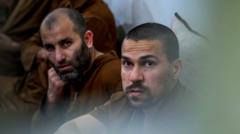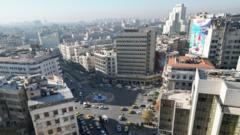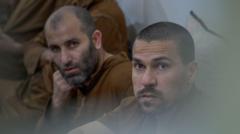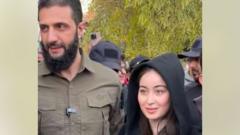The aftermath of Syria's 13-year civil war has seen the Kurdish-led Syrian Democratic Forces grappling with new existential challenges, particularly from Turkey, which views them as a significant threat.
### Kurdish Forces in a Shifting Political Landscape: The Aftermath of Syria's Civil War

### Kurdish Forces in a Shifting Political Landscape: The Aftermath of Syria's Civil War
As Syria's civil war concludes, Kurdish groups find themselves vulnerable to renewed threats from Turkey and rival factions.
In a recent funeral in Manbij, Syria, five fighters from the Kurdish-led Syrian Democratic Forces were laid to rest following clashes with Turkish-backed opposition factions. These events highlight the ongoing peril faced by the Kurdish minority in the region, as the war that once pitted government forces against rebel fighters has concluded, yet stability remains elusive.
The Syrian Democratic Forces (SDF) have been a crucial ally to the United States, successfully combating the extremist group Islamic State and managing the detention of numerous fighters associated with it. However, as the power dynamics shift in Syria post-civil war, Kurdish groups find themselves at odds with the Syrian National Army, a militia supported by Turkey.
For decades, Turkey has perceived the Kurdish forces in Syria as affiliated with the Kurdistan Workers’ Party (P.K.K.), a group involved in a prolonged conflict against the Turkish state. The Turkish government, under President Recep Tayyip Erdogan, has been seizing the opportunity presented by Syria's political transformation to inherently pursue its agenda against Kurdish fighters, further complicating the region's security landscape.
With the new balance of power emerging from the collapse of the Assad regime, Kurds in Syria feel increasingly threatened. The subsequent rise in hostilities could lead to further conflict, particularly in strategic areas like the city of Kobani—a potential flashpoint in the ongoing struggle for territorial control.
The role of the United States will be crucial as the Kurdish forces navigate these turbulent waters, seeking to bolster their position amidst a backdrop of shifting alliances and renewed hostilities. In the end, the fate of Syria's Kurdish minority hangs in the balance as competing factions vie for dominance over the war-torn region.
The Syrian Democratic Forces (SDF) have been a crucial ally to the United States, successfully combating the extremist group Islamic State and managing the detention of numerous fighters associated with it. However, as the power dynamics shift in Syria post-civil war, Kurdish groups find themselves at odds with the Syrian National Army, a militia supported by Turkey.
For decades, Turkey has perceived the Kurdish forces in Syria as affiliated with the Kurdistan Workers’ Party (P.K.K.), a group involved in a prolonged conflict against the Turkish state. The Turkish government, under President Recep Tayyip Erdogan, has been seizing the opportunity presented by Syria's political transformation to inherently pursue its agenda against Kurdish fighters, further complicating the region's security landscape.
With the new balance of power emerging from the collapse of the Assad regime, Kurds in Syria feel increasingly threatened. The subsequent rise in hostilities could lead to further conflict, particularly in strategic areas like the city of Kobani—a potential flashpoint in the ongoing struggle for territorial control.
The role of the United States will be crucial as the Kurdish forces navigate these turbulent waters, seeking to bolster their position amidst a backdrop of shifting alliances and renewed hostilities. In the end, the fate of Syria's Kurdish minority hangs in the balance as competing factions vie for dominance over the war-torn region.




















